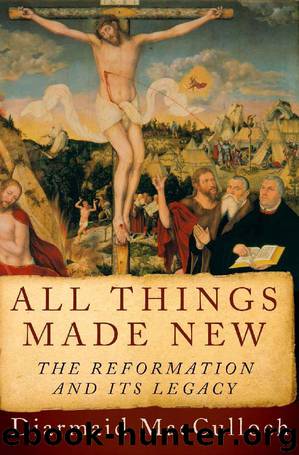All Things Made New: The Reformation and Its Legacy by Diarmaid MacCulloch

Author:Diarmaid MacCulloch [MacCulloch, Diarmaid]
Language: eng
Format: epub
Tags: Christianity, History, Protestantism, Religion
ISBN: 9780190616816
Google: FlKsDAAAQBAJ
Amazon: B01J86B2NA
Publisher: Oxford University Press
Published: 2016-03-15T03:00:00+00:00
18
Modern Historians on the English Reformation
In 1971 and early 1972, as a final-year Cambridge undergraduate, I turned to the study of the English Reformation, under the able supervision of Felicity Heal, while attending the lectures of a wonderfully rackety and quirkily learned Fellow of Selwyn, the late and much-lamented patron of the Cambridge Footlights, Harry Porter. The course was entitled ‘Thought and Religion in England 1500 to 1650’, and it was fairly cutting-edge by the standards of its day: a genuine effort to reach across the divide then standard between the History and Divinity Faculties. It also tried to integrate England with mainland Europe – what in those days we would routinely call, with sublime and literal insularity, ‘the Continent’.1
It helped that one of the great figures in Cambridge’s Divinity Faculty was Gordon Rupp, a historian of the Reformation who had long taken seriously the integration of England’s Reformation history with the rest of Europe, witness his little compilation of his essays in 1947, still well worth reading, Studies in the Making of the English Protestant Tradition. Indeed, it was perhaps a major factor in delaying an update in English Reformation studies that Rupp turned away from writing about the English Reformation after 1947. Rupp had wide-ranging interests which produced a perceptive study of Martin Luther’s theology and a superb volume on English religion in the eighteenth century,2 but there was one particularly important element in his broad vision: he was a Methodist minister, and thus existentially at one remove from the prevailing narrative of what the English Reformation had been about.
What was this hegemonic narrative? It was, of course, Anglican – and not just Anglican, but High Church Anglican. There had once been a rival, the Evangelical Anglican hegemonic story, which could look back to the pioneering primary source research of two very clever seventeenth-century bishops, John Williams of Lincoln and York and Gilbert Burnet of Salisbury (Burnet being perhaps the greatest of Anglican historians), plus the decidedly less stellar but extremely hard-working perpetual curate of Low Leyton, Essex, John Strype. Williams, Burnet and Strype had created a narrative of the Reformation which was robust and actually resembled its reality.3 But Victorian Evangelicals had largely abandoned their interest in high culture, which had once been considerable, and they shunned the ‘Humanities’ sector in higher education just as it was developing in the 1880s.4 By and large, they had not concerned themselves with the newly established and godless History departments of late Victorian universities, or with university Theology departments which they would have regarded as even more pernicious in their teachings.
As a result, adherents of the Oxford Movement, or the wider world of Anglo-Catholicism, were dominant in the practice of religious history at university level, and they continued to be, well into the twentieth century. There is still a ghost of this in the undergraduate History syllabus of my own Theology Faculty. A theology undergraduate interested in Church history can study the Early Church, the medieval Church, the Reformation and the nineteenth century.
Download
This site does not store any files on its server. We only index and link to content provided by other sites. Please contact the content providers to delete copyright contents if any and email us, we'll remove relevant links or contents immediately.
The Gnostic Gospels by Pagels Elaine(2527)
Jesus by Paul Johnson(2352)
Devil, The by Almond Philip C(2324)
The Nativity by Geza Vermes(2226)
The Psychedelic Gospels: The Secret History of Hallucinogens in Christianity by Jerry B. Brown(2148)
Forensics by Val McDermid(2087)
Going Clear: Scientology, Hollywood, and the Prison of Belief by Lawrence Wright(1974)
Going Clear by Lawrence Wright(1962)
Barking to the Choir by Gregory Boyle(1819)
Old Testament History by John H. Sailhamer(1809)
Augustine: Conversions to Confessions by Robin Lane Fox(1768)
The Early Centuries - Byzantium 01 by John Julius Norwich(1730)
A Prophet with Honor by William C. Martin(1717)
A History of the Franks by Gregory of Tours(1713)
Dark Mysteries of the Vatican by H. Paul Jeffers(1704)
The Bible Doesn't Say That by Dr. Joel M. Hoffman(1676)
by Christianity & Islam(1627)
The First Crusade by Thomas Asbridge(1601)
The Amish by Steven M. Nolt(1562)
